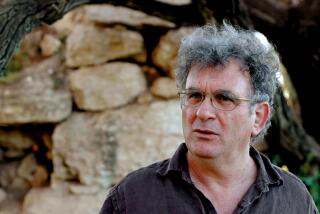NEWS ANALYSIS : Peres Appeals for Unity as a Shocked Israel Mourns Rabin : Leadership: Political observers agree former foreign minister has the will to pursue peace. What isn’t clear is whether he can pull nation together.
- Share via
JERUSALEM — Shocked to the core by the assassination of Prime Minister Yitzhak Rabin, Israelis on Sunday wondered whether his successor, Foreign Minister Shimon Peres, will be able to continue the peacemaking effort the two old rivals launched together.
Political analysts agree that Peres has the drive and the will to push forward. What remains to be seen is whether he has the strength to pull together this deeply divided and traumatized nation and lead it to the fulfillment of his dream of making peace with all of Israel’s neighbors.
“Peres has a strong sense of history and of his role in it,” said Dedi Zucker, a left-wing lawmaker. “He wants to finish the job.”
Indeed, after the Cabinet asked him to serve as acting prime minister, Peres told the grieving nation Saturday night: “I asked myself, if this happened to me, what would I want to have happen later? I have one answer--to continue the path of peace.”
But Sunday, Peres sounded less sure of himself.
“My heart is torn between unprecedented grief and a bottomless pit of worry,” he told Israel Radio.
Rabin’s killer told interrogators that he had planned to kill both leaders, hoping that by doing so he would kill their dream of achieving peace between Israelis and Palestinians through territorial compromise.
But Peres left the podium early, walking away from where he and Rabin addressed a mass rally for peace in Tel Aviv’s central square a couple of minutes before the prime minister. Yigal Amir, Rabin’s killer, told interrogators that he regarded Peres as a “secondary” target and opted to wait for the prime minister.
The tough old general, who seemed so indestructible to generations of Israelis, bled to death within minutes after Amir brushed past Rabin’s bodyguards and shot him at point-blank range.
Peres, the survivor, is a self-described dreamer, a man whose irrepressible optimism has always contrasted painfully with Rabin’s caution, whose impulsiveness has always seemed flighty next to Rabin’s rock-solid commitment to security.
In past years, a dismissive Rabin would speak of Peres as a “big thinker” who somehow never followed through on his ideas. But Peres wore his dreaminess like a badge of pride, even when it proved a political liability.
“Now in my 70s, as I look back over my life, a phrase comes to mind that was coined by Gabriel Garcia Marquez in one of his stories: ‘an unpaid dreamer,’ ” Peres wrote in his memoirs on making peace with the Palestinians, published after the peace accord was signed in Washington in September, 1993.
“My life’s work is not yet done. The final crowning chapters of my biography are still being written at this time. They deal with the subject closest to my heart: peace. . . . I feel that I have earned the right to dream.”
It is that fierce determination to reach for the seemingly impossible that makes even Peres’ allies nervous about his chances of winning the nation’s trust.
“The public is suspicious of Peres and of those of us like him, because they sense that we have moral considerations, or take into account the interests of the other side in these negotiations,” said Tsaley Reshef, a Peace Now activist and a candidate on the Labor Party slate for Parliament. “Rabin had the virtue of being perceived by the public as Mr. Security, a man who worried about Israelis.”
If Peres is going to pursue his dream with the slim majority his government holds in the Knesset, Israel’s Parliament, he must quickly move to shore up his security credentials with the public, Reshef and other analysts said.
“I worry about the lack of balance now,” said Zeev Schiff, senior military affairs analyst for the Haaretz newspaper. “Rabin and Peres served as a check and balance to each other, and they made the process work. Now the balance will be gone, I fear.”
To allay that fear--which many Israelis share--Peres is likely to name Ehud Barak, the former military chief of staff who recently joined the Cabinet, as defense minister--a post Rabin held in addition to the prime minister position. Unlike Peres, Barak has impeccable credentials as a combat soldier and is considered a brilliant strategist.
Although he served as defense minister and was the key architect of Israel’s nuclear weapons capability, Peres never served in a combat unit. It is a gap in his resume--in a nation that prizes valorous military service--that neither the public nor Rabin ever let him forget.
Barak is seen as skeptical of the Palestinians and wary about the Israeli military pullout that has just gotten under way in the occupied West Bank. Peres is seen as gullible and too eager to rush into compromise for the sake of signing agreements.
“Together with Barak, Peres may gain the confidence and support of the public,” Reshef said.
It may be wishful thinking. Barak is deeply respected, but he is not the almost legendary figure that Rabin was.
Rabin was present at the birth of the nation and fought in nearly all its wars. Yet even Rabin was demonized after he reversed himself and opted to make peace with the Palestine Liberation Organization and offered territorial compromise with Syria on the Golan Heights.
In addition to his failure to serve in a combat unit, Peres has been plagued for decades by a public sense that he is untrustworthy--a feeling Rabin promoted in his memoirs when he described Peres as working behind his back to undermine his authority in the 1970s, when Peres served as defense minister in Rabin’s government.
Ironically, Peres was a hawk back then, championing the settlement drive of Gush Emunim (the Bloc of the Faithful) that eventually produced more than 100 Jewish settlements in the West Bank and has made territorial compromise with the Palestinians so complex.
Throughout the 1970s, as Peres and Rabin conducted monumental political battles in seesawing bids to control the Labor Party, both men bashed away at each other in public and in private.
In the end, however, a shared vision of achieving peace as a strategic necessity for Israel made it possible for the two to work together.
In 1992, Rabin became leader of the Labor Party. After the party won enough seats in national elections to form the government, Peres and Rabin embarked on their gamble of making peace with PLO leader Yasser Arafat.
In a poignant moment Saturday night, Peres and Rabin embraced publicly for the first time that anyone could remember as they drank in the cheers of the more than 100,000 people who answered Labor’s call to turn out at Kings of Israel Square and celebrate peacemaking. The two old foes stood arm in arm just minutes before Rabin was gunned down.
On Sunday, Peres recalled the intense happiness he thought Rabin experienced during the rally.
“I knew Yitzhak in rivalry and in friendship. . . . We shared a rivalry like I have never known in my life, and a friendship of the same sort, for nearly half a century,” Peres said.
“I have never seen him as happy, soft, content, at peace with himself, as in those two hours when he was surrounded with the masses of the Israeli people--young, adults, old people, bereaved families. He felt the wind and spirit of love, of appreciation coming from these people--feelings he did not know often over the last few years.”
More to Read
Sign up for Essential California
The most important California stories and recommendations in your inbox every morning.
You may occasionally receive promotional content from the Los Angeles Times.













